Charlie Hebdo attack: Print run for new issue expanded
- Published
The BBC's Hugh Schofield reports from a kiosk in Paris as people queue to buy the latest issue
Millions more copies of French weekly Charlie Hebdo are being printed after the first run sold out in hours.
The normal print run of 60,000 was extended to five million - a week after Islamist gunmen murdered 12 people at the magazine's offices and five others in subsequent attacks in Paris.
The "survivors' issue" has angered some Muslims by depicting the Prophet Muhammad on its cover.
A video purportedly from al-Qaeda in Yemen said it planned the Hebdo attack.
US state department spokeswoman Marie Harf said they believed the video was authentic but could not determine if its claims were true.
The group, AQAP, had previously welcomed the attack, without acknowledging any role in the operation.
The gunmen are said to have used earlier publication of images of the Prophet as justification for their attack on the magazine.
Charlie Hebdo's latest cover shows a cartoon depicting the Prophet Muhammad weeping while holding a sign saying "I am Charlie", and below the headline "All is forgiven".
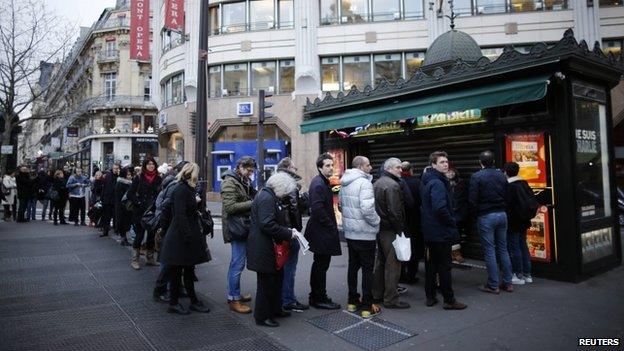
People waited for kiosks to open to buy the magazine
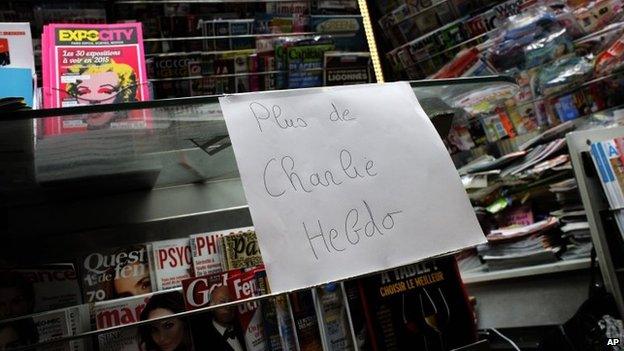
All copies of the magazine were sold out by Wednesday morning at this Paris newsstand
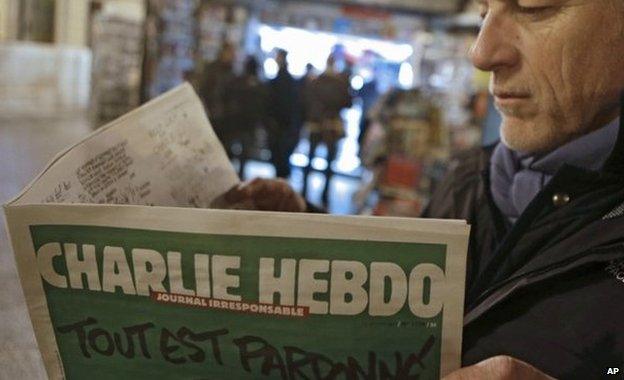
Some kiosks said they had received dozens of reservation requests
"I am Charlie" emerged as a message of support for the magazine following the attack on 7 January, which left eight journalists, including its editor, dead in addition to four others.
In a separate attack in Paris two days later, an Islamist gunman killed four Jewish men and took hostages at a kosher shop.
The same attacker is believed to have shot a policewoman the day before.
'Charlie is alive'
Normally Charlie Hebdo prints 60,000 copies but the planned run increased steadily this week - from one million to three million to five million.
Charlie Hebdo editor-in-chief Gerard Biard comforted Renald 'Luz' Luzier, who drew the latest cover, at a news conference
The "survivors' issue", as the magazine calls it, is available in six languages including English, Arabic and Turkish. Proceeds are going to victims' families.
President Francois Hollande has insisted the magazine and its values will continue.
"Charlie Hebdo is alive and will live on," he said. "You can assassinate men and women but you will never kill their ideas."
Charlie Hebdo's decision to publish another cartoon of the Prophet drew threats from militant Islamist websites and criticism from the Islamic world.
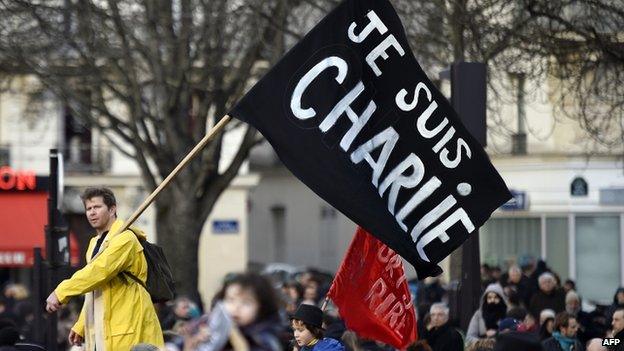
On Sunday, about 1.5 million people rallied in Paris in a show of solidarity with the victims
The Islamic State (IS) militant group said it was "an extremely stupid act".
Meanwhile, a new video apparently from AQAP said the group had planned and financed the Charlie Hebdo attacks in "vengeance for the Prophet".
It said it was a "success" that the magazine shootings had "coincided" with the attacks by supermarket gunman Amedy Coulibaly.

Analysis: BBC security correspondent Frank Gardner
The video purporting to come from AQAP does appear to be genuine but questions remain over just how closely AQAP was really involved in last week's Paris attacks. More than two years have elapsed since Said Kouachi, one of the three gunmen, is believed to have slipped out of Yemen after spending time there with al-Qaeda members, including the extremist preacher Anwar Al-Awlaki.
He is mentioned in the video in connection with the attack planning but Al-Awlaki was killed back in 2011 in a US drone strike so, again, that would be a long time to plan such a relatively simple but devastating attack.
It is also odd that AQAP have not issued any so-called "martyrdom videos", showing the perpetrators giving their justifications ahead of the raid.
These may still be to come but for now it seems the connection between the Paris attackers and AQAP is more one of inspiration, ideology and training rather than close direction and leadership.

Coulibaly had pledged allegiance to IS in a video message while the Charlie Hebdo attackers, Said and Cherif Kouachi, had said they were acting on behalf of AQAP.
Coulibaly had said they had co-ordinated the attacks but experts say it is highly unlikely IS and AQAP, rivals in the Middle East, would work together.
Meanwhile a lawyer for Said Kouachi's wife, Soumya, has told the BBC she had no idea he was an extremist. He said Kouachi had kissed his wife goodbye and told her he was visiting his brother, because he was unwell, just hours before the Charlie Hebdo attack.
"It's beyond her understanding, her world has fallen apart," the lawyer, Antoine Flasaquier, said.
Soumya Kouachi's lawyer: "Her husband told her he was going to Paris to see his brother Cherif"
Ban on distribution
The magazine's release comes after millions - including dozens of world leaders - took part in a unity rally in Paris on Sunday.
Outside France, the Washington Post, Germany's Frankfurter Allgemeine, Corriere della Sera in Italy and the UK's Guardian are among publications that have shown the latest cartoon.
The BBC has published the image in a previous story and in a statement said: "We have made the editorial judgment that the images are central to reporting the story."

Why people are buying the magazine
Why is it important for Parisians to buy this issue of Charlie Hebdo?
Catherine Boniface, Paris: "This issue is symbolic, it represents their persistence, they didn't yield in the face of terror."
Read more: In the queue for Charlie Hebdo

Meanwhile, the interior minister of Senegal - whose president took part in the Paris march - has issued an order banning the distribution of the magazine, according to the national news agency.
Comedian arrested
Several hundred people attended the funeral on Wednesday of Michel Renaud, who was killed while visiting Charlie Hebdo's offices.
Ceremonies were held for seven other victims in France and Israel on Tuesday.
New mobile phone footage shows the Kouachi brothers opening fire on police
Meanwhile, controversial French comedian Dieudonne M'bala M'bala has been arrested for "defending terrorism, external" after he likened himself to gunman Amedy Coulibaly.
A judicial source quoted by AFP news agency said he was due to be released on Wednesday evening but would face trial at a later date.
Police are also investigating some 50 people suspected of "condoning terrorism" and 25 cases of people attacking or defacing Muslim places of worship.

How the attacks unfolded (all times GMT)
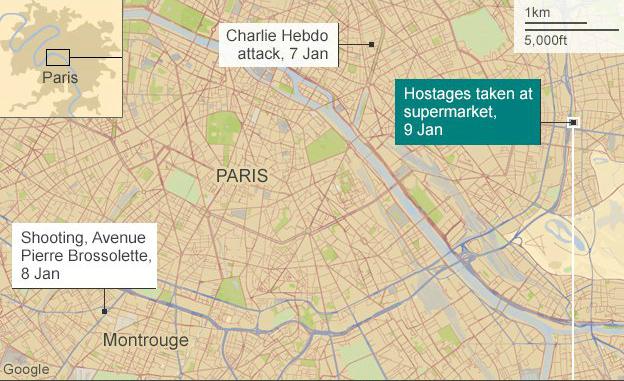
Wednesday 7 January 10:30 - Two masked gunmen enter Charlie Hebdo offices, killing 11 people, including the magazine's editor. Shortly after the attack, the gunmen kill a police officer nearby.
11:00 - Police lose track of the men after they abandon their getaway car and hijack another vehicle. They are later identified as brothers Said and Cherif Kouachi.
Thursday 8 January 08:45 - A lone gunman shoots dead a policewoman and injures a man in the south of Paris. Gunman later identified as Amedy Coulibaly.
10:30 - The Kouachi brothers rob a service station near Villers-Cotterets, in the Aisne region, but disappear again.
Friday 9 January 08:30 - Police exchange gunfire with the Kouachi brothers during a car chase on the National 2 highway northeast of Paris.
10:00 - Police surround the brothers at an industrial building in at Dammartin-en-Goele, 35km (22 miles) from Paris.
12:15 - Coulibaly reappears and takes several people hostage at a kosher supermarket in eastern Paris. Heavily armed police arrive and surround the store.
16:00 - Kouachi brothers come out of the warehouse, firing at police. They are both shot dead.
16:15 - Police storm the kosher supermarket in Paris, killing Coulibaly and rescuing 15 hostages. The bodies of four hostages are recovered.
